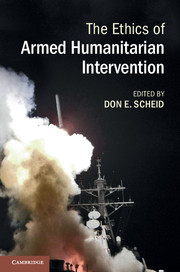Book contents
- Frontmatter
- Contents
- Notes on contributors
- Preface and acknowledgments
- List of abbreviations and acronyms
- Part I Intervention and debate
- 1 Introduction to armed humanitarian intervention
- 2 Revisiting armed humanitarian intervention
- 3 The responsibility to protect and the war in Libya
- Part II Moral perspectives
- Part III Ideas and reconsiderations
- Select bibliography
- Index
- References
2 - Revisiting armed humanitarian intervention
A 25-year retrospective
Published online by Cambridge University Press: 05 June 2014
- Frontmatter
- Contents
- Notes on contributors
- Preface and acknowledgments
- List of abbreviations and acronyms
- Part I Intervention and debate
- 1 Introduction to armed humanitarian intervention
- 2 Revisiting armed humanitarian intervention
- 3 The responsibility to protect and the war in Libya
- Part II Moral perspectives
- Part III Ideas and reconsiderations
- Select bibliography
- Index
- References
Summary
The use of military forces either for the purpose of halting or impeding a humanitarian disaster, or for providing relief and restoring order in the aftermath of one, is hardly a new phenomenon. What is genuinely new about the recent record of humanitarian military interventions during the past 25 years, however, is that such efforts have become the principal justification (beyond national self-defense) for maintaining and deploying national military forces. The militaries of Canada, Australia, and the United Kingdom, as well as of France, and the combined forces of the NATO alliance (under the lead of Danish, Dutch, and Belgian forces), all have such peacekeeping and stabilization operations among their core missions (alongside defense of the homeland). The United States, meanwhile, since 1991, has increasingly defined its role in international relations in terms of such missions, while sequestering an astonishingly large, and ever-increasing logistical stockpile to support them. Although armed humanitarian intervention (AHI) in fact has a relatively long and somewhat blinkered history, merely reciting that history is of little but mild antiquarian interest, however, unless something substantive can be learned from it concerning what this recent and dramatic inversion or re-ordering of conventional military priorities portends for the future of international conflict and military professionalism.
In this chapter, accordingly, I propose to examine the dramatic transformation of international priorities governing the purpose and principal uses of military force over the past 25 years. I will first distinguish the broader historical background of armed humanitarian intervention prior to 1989 (what we might term “first-wave” AHI) from two subsequent, distinctive phases: a “second wave” of humanitarian crises and responses during the 1990s, and a more recent “third wave” of ethical analysis, dominated by proposals for new political arrangements that would govern collective decision-making by the international community when faced with the question of whether to deploy their military forces for the prevention or cessation of humanitarian crises.
Keywords
- Type
- Chapter
- Information
- The Ethics of Armed Humanitarian Intervention , pp. 26 - 45Publisher: Cambridge University PressPrint publication year: 2014

